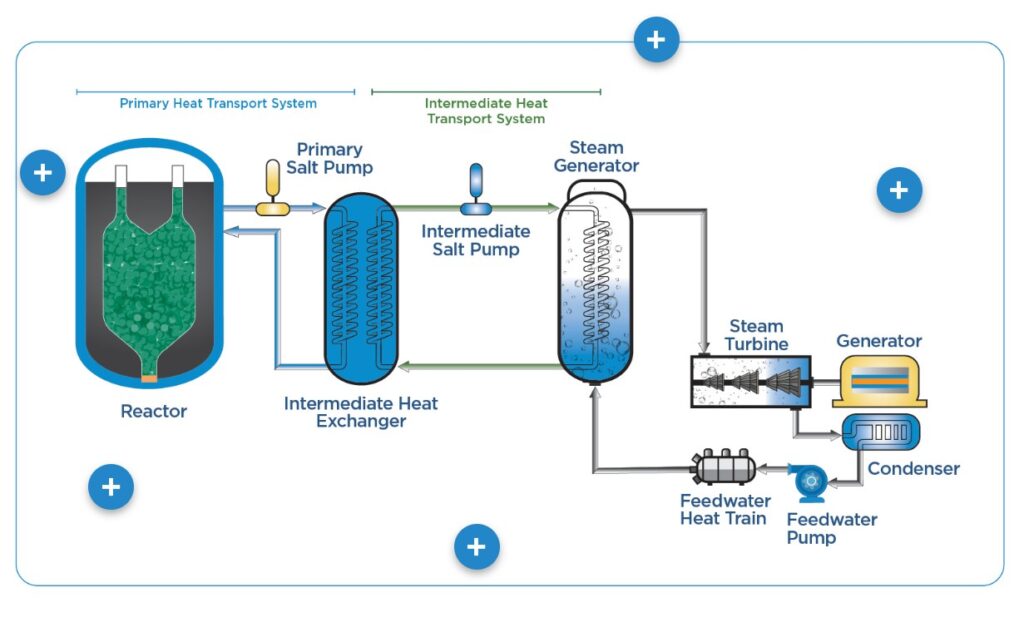The United States is on the cusp of a significant evolution in nuclear energy production with the development and imminent deployment of its first commercial small modular reactor (SMR). SMRs represent a transformative approach to nuclear power, boasting a significantly smaller infrastructure footprint compared to traditional fission reactors and are touted as being much safer.
Although small nuclear reactors have been in existence since the 1950s, the modern iteration of SMRs marks a pivotal shift. These reactors could profoundly impact sectors that require large amounts of consistent power, such as AI training facilities, data centers, and cryptocurrency mining operations. Unlike their larger predecessors, SMRs can be manufactured in a centralized factory setting and then transported to and assembled at the client’s location, offering a flexible and scalable energy solution that could potentially deliver up to 300 megawatts of power.

Cryptocurrency Mining’s Energy Dilemma
The energy consumption of cryptocurrency mining has been a point of contention and concern, driving the industry’s interest in more sustainable and less environmentally impactful solutions. Currently, there are numerous studies focusing on the integration of clean energy sources within the crypto mining sector. Many major mining operations are already exploring nuclear energy as a viable alternative due to its minimal environmental footprint compared to fossil fuels.
The adoption of SMRs could address several critical barriers currently facing the crypto mining and AI industries, including the high initial costs and the limited availability of traditional nuclear power. SMRs are designed to be easier to deploy and maintain, require fewer operational staff, and offer an environmentally friendly energy source. Despite these advantages, the significant initial capital required to develop these reactors remains a substantial hurdle.
Google’s Pioneering Nuclear Venture
In a landmark move, Kairos Power, a leading U.S. nuclear engineering firm, has partnered with Google to spearhead the development of the company’s first SMR, with aims to bring it online swiftly and safely by 2030. This collaboration is part of a broader plan with additional rollouts stretching into 2035. Michael Terrell, senior director of energy and climate at Google, emphasized that this initiative is set to accelerate the shift towards sustainable energy, adding 500 MW of new 24/7 carbon-free power to the U.S. electricity grids.
This strategic partnership potentially marks the beginning of commercial nuclear power’s new phase in the U.S., positioning Google at the forefront of this emerging industry.
Economic and Environmental Impact of SMRs
While the initial costs of developing on-site nuclear power capabilities such as SMRs are high, these expenses are expected to decrease as the technology matures and production scales. The table below highlights the potential economic and environmental impacts of adopting SMRs in industries that demand high energy consumption:
| Impact Area | Benefits of SMRs |
|---|---|
| Cost Efficiency | Lower operational and maintenance costs compared to large reactors. |
| Environmental Impact | Reduced carbon footprint, contributing to cleaner energy generation. |
| Scalability | Modular design allows for incremental capacity increases. |
| Safety | Advanced safety features reduce the risk of accidents. |
| Energy Independence | Enables facilities to operate independently from traditional grids. |
As industries like cryptocurrency mining continue to grow, the demand for sustainable and cost-effective energy solutions will escalate. SMRs could very well become the most economically and environmentally prudent method for meeting these energy needs, especially in the absence of a significant breakthrough in fusion technology.
Google’s venture into SMR technology not only underscores the tech giant’s commitment to sustainable practices but also signals a promising future for energy-intensive sectors. As this technology progresses, it could provide a blueprint for other companies seeking to reduce their environmental impact and operational costs through innovative energy solutions.










